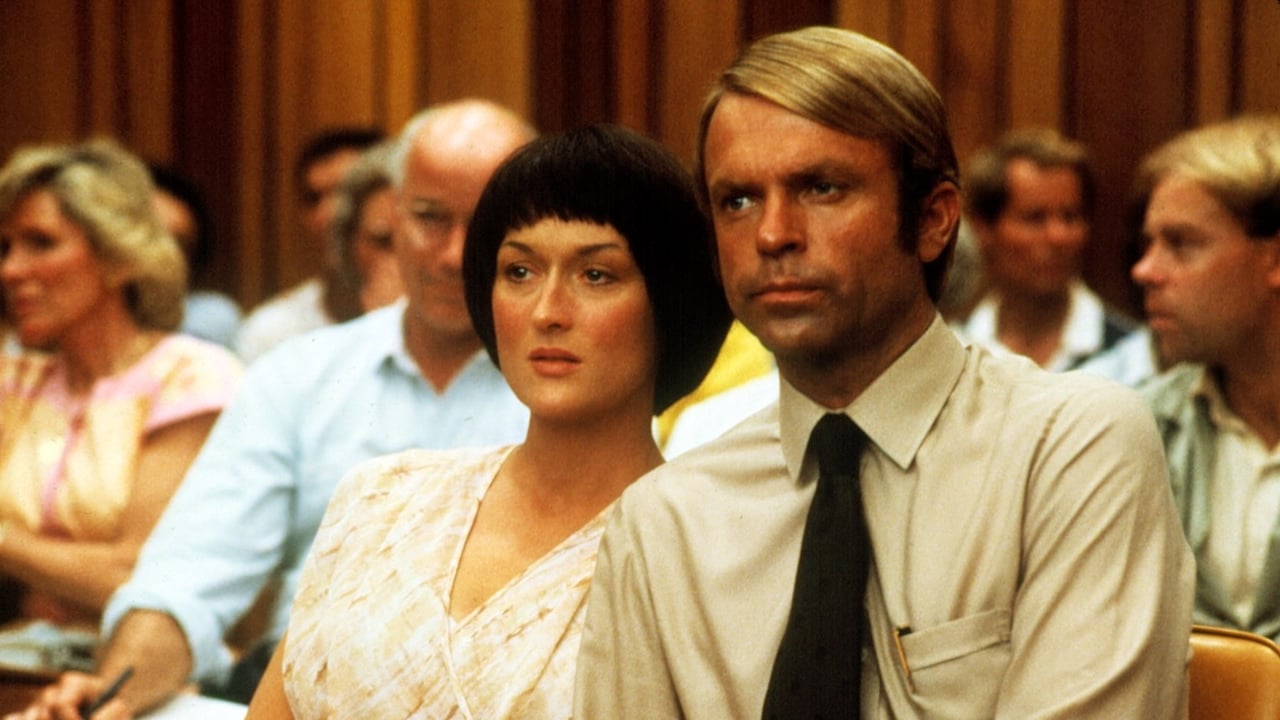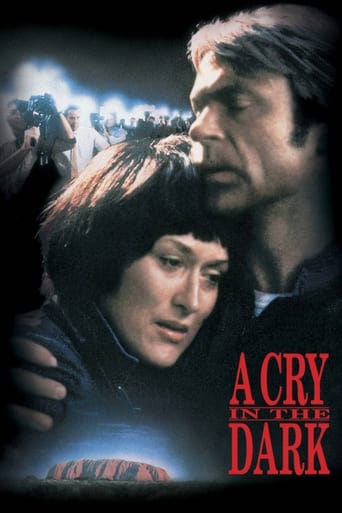

You won't be disappointed!
... View Moreeverything you have heard about this movie is true.
... View MoreBlistering performances.
... View MoreExactly the movie you think it is, but not the movie you want it to be.
... View MoreBest remembered by cinephiles as the film won Meryl Streep a Cannes BEST ACTRESS trophy and is among one of her 19 Oscar-nominated performances, A CRY IN THE DARK is a faithful adaptation of a sensational true story in Australia, about Lindy Chamberlain (Streep), a mother of three, and her parson husband Michael (Neill), the former is accused of murdering her newborn baby daughter during a camping trip in Ayers Rock in 1980, while she claims the baby is snatched by a dingo, and the latter is charged as an accessory. Now this case is already cleared as their convictions have been overturned in 1988 when new key evidence emerges.Before watching the movie, I have no idea how the story will wind up, all I know is that it is a thorny case of whether a mother murders her own child or not, so I conjecture it would straddle the key issue of the mother's innocence, but director Fred Schepisi (SIX DEGREES OF SEPARATION 1993, 6/10) gives a firm hand in exerting Lindy's innocence, and vigilantly indicts the media's hullabaloo and hyper coverage, the spuriousness lies in the forensic system and the public's collective impressionability maliciously based on mislead first impression and personal prejudice. The Chamberlains are Seventh-Day Adventists, the tragedy and its segueing emotional toll also affect their beliefs, not to mention the vicious allegations of their cultish sacrifice, especially for Michael, who implores God for a reason to take away their daughter, cries out that hell can't be worse than this when they are on trial for a egregious but fictitious crime, his unraveling is perceptibly characterised by a blond Sam Neill. Running parallel to Michael's deterioration, Meryl's Lindy is the backbone of the whole myth, she is not a grieving mother who is all teary-eyed and rueful of her ephemeral inattention, she is tougher than her husband, not intend to indulge in grievance as life must go on, so in front of the camera, she seems aloof, withheld, a shade indignant, which generates a negative impression among the spectators, when malign rumours run amok, she tries to right the falsehood with more media involvement which is sardonically a wishful thinking. I'm no expert of accent, but it is swell to watch Meryl articulate a New Zealand accent (Lindy is New Zealand born in real life) without any feigned effort betrayed. Here Meryl shines magnificently all through to be unfathomable and detached, even during the most pulverising point, she is resolutely staunch, and her scenes in the courtroom are paradigm of balancing heart-rending outburst with constrained implosion, it is OK to being wronged, it is not the end, since she doesn't kill her baby, there is no guilty conscience exuded as all the onlookers are eagerly expecting in front of their televisions. Aesthetically the film is more in line with a solid TV movie sending many significant social messages, but there are way too many gratuitous reaction shots of bystanders thrust every now and then, as they can hardly have any saying versus the final verdict, it serves only as a repeated reminder of how ignorant is the public and how easily they can be influenced by a manufactured national hoopla. It seems that Schepisi pushes fairly too hard this time, otherwise, the film remains comparatively relatable and if you adore Meryl Streep, you should not let it slip through your fingers.
... View MoreYes folks, this is it... the origin of that popular quote " A DINGO ATE MY BABY!!" ( Though, you never actually hear those words said in the film) It all derives from a true story about how a religious, devoted mother off on a little trip deep in the Aussie Outback with her husband and two other kids has her baby abducted and ultimately devoured by a particularly strong dingo. Unfortunately, just when the couple are coming to terms with their loss, foul play is suspected and they're hauled into court accused of murder, pursued by a dogged (geddit?) press and disbelieved by a suspicious public. Can their relationship take the strain, and will they stay out of jail? Of course, if you followed the coverage at the time, you'd already know the answer to that, but try not to spoil it for those who didn't...Films based on actual events don't come any better than this, as we find ourselves immersed in this living nightmare for the married pair, where everyone has an opinion on what happened, the media is out to get them and even the police seem untrustworthy. Painstaking research must have been done, as we hear every angle of the case covered in minute deal... It's like we're there, in the gallery, watching events transpire before our eyes. This might be all for nought if the acting wasn't up to scratch, but in Streep and Neill they have two true professionals who accurately portray every minute of heartbreak and frustration that their real-life counterparts must have faced. Streep especially is perfect; with a dead-on accent to boot; not surprisingly, she won yet ANOTHER Oscar nomination.There is still those who think Lindy is guilty, after four trials and plenty of evidence backing her story.Probably the same people who think Man never landed on the Moon, There were two shooters when JFK got assassinated and Global Warming is a myth. You know who you are. Weirdos... 8/10
... View MoreIt was one of the most intriguing mysteries of the twentieth century. On 17 August 1980, Lindy and Michael Chamberlain were on a family camping trip to Uluru (Ayers Rock), when their nine-week-old daughter, Azaria, disappeared. The couple maintained that she had been taken by a dingo, but circumstantial evidence, which included Lindy's confrontational personality and the family's religious beliefs, led to the perception within Australia that Azaria had been murdered by her mother. As many readers will know, Lindy was convicted of the crime after a trial that received unprecedented media coverage (rivalled only by Madeleine McCann's disappearance in 2007) and served three years in prison, before new evidence emerged which exonerated her.Hearing the news this morning that, at long last, an Australian coroner has served the Chamberlains with a death certificate confirming that Azaria was killed by a dingo, reminded me of how brilliantly the family's struggle for justice was portrayed in A Cry in the Dark.Quite often, the courtroom drama, so popular in the 1980s, can be a very formulaic film genre. The undoubted tension of real-life courtrooms rarely translates into exciting films; some exceptions being, I believe, Primal Fear (1996) and Jagged Edge (1985). The success of those films, like that of A Cry in the Dark, is chiefly down to their having an eerie, highly ambiguous mystery at their hearts which keeps the audience gripped. Indeed, Fred Schepisi's film focuses on conversations between anonymous characters throughout Australia in order to reflect the circus-like attention the Chamberlain case received.Meryl Streep's performance is key to maintaining the central ambiguity. In the film, Lindy is both a common housewife who is simply determined to prove her innocence and a potentially sadistic murderess. Despite your sympathy for her, the nagging doubt that Lindy might be guilty persists until the final scenes, and this prevents A Cry in the Dark from becoming predictable - even though you know the outcome.Like so many times in her acting career, Streep fully transforms herself into the human being she is portraying: accent immaculate (to my untrained ears at least), mannerisms, everything. She is Lindy Chamberlain - a hard person to like in some ways, but someone whom you instantly admire for her courage and conviction. Though nominated for the Best Actress Oscar, Streep uncharacteristically (and unjustly) didn't win on this occasion, although perhaps I should applaud this fact, given my last blog entry about Biopics.Sam Neill puts in, arguably, his best performance as Michael Chamberlain, Lindy's loyal but weaker husband. His struggle to defend his family's honour from the lawyers and reporters seemingly intent on breaking it apart is truly poignant, especially as even he must quash those nagging doubts regarding Lindy's innocence. It's not just the acting that makes this a great film, however; the razor-sharp script helps Streep and Neill along, the musical score (so 80s) is suitably mysterious, and the judicious editing makes for an intelligent and smooth viewing experience.A Cry in the Dark is a film that doesn't outstay its welcome. It begins, it delivers its emotive story, then it ends. It's about family loyalty and the often-malevolent influence of the press, an issue which is more relevant today than ever. Those of you who haven't seen this film should, and those who haven't seen it in awhile should reappraise it.Culturally significant and thoroughly entertaining.For more film reviews: http://ins-kino.blogspot.co.uk/
... View MoreA Cry in the Dark is a solid film, one that could have easily gone off the tracks but is instead well directed and written. The sentimentality feels honest and true, as it is in real life. As much as the film makes you think about the actual case, it's also a vehicle for Streep's incredible performance. I'm still amazed to this day how well she can play in different accents. Here, she shows at first her grief, but also her resentment and her anger towards what is happening to her. I don't know much about the real woman, but Streep plays this character incredibly. She's very resistant to showing emotion to the media, but you can see her true sadness and exhaustion. Overall, a worthy piece to the case.
... View More